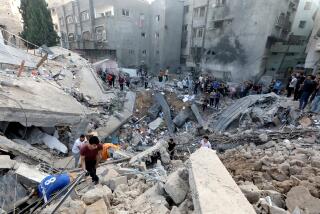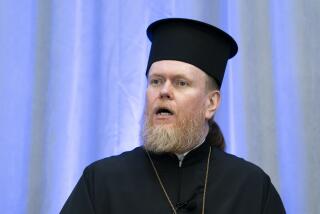Church Leaders Urge Wider Peace
- Share via
With the end of the war in the Persian Gulf, mainline Protestant church leaders are warning that it is critical to address other outstanding issues in the region to ensure lasting peace in the Middle East.
In written statements and in interviews in the days immediately after the Gulf cease-fire, leaders of major Protestant bodies voiced concerns about the effect of the war on the region as a whole and reiterated calls for a comprehensive international conference to address other unsettled Middle East issues, particularly the Palestinian problem.
In a statement, National Council of Churches General Secretary James Hamilton said: “Countless billions have been spent on war. Now, we pray that with the same intentionality, single-minded dedication, fervor and sacrifice, the leaders of our and other nations will pursue a just, lasting peace.”
He said, “The pursuit of peace must begin with the recognition of the legitimate rights of the Palestinian people to a self-determination and a home of their own, and the right of every state in the area, including Israel, to live in peace within secure and recognized boundaries free from threats or acts of force.”
Hamilton said an international conference should be called to address Israeli-Palestinian concerns, to be followed by a “Conference on Peace, Security and Cooperation in the Middle East” that would include “equal participation of all interested states and peoples.”
The Rev. James Andrews, stated clerk of the Presbyterian Church (U.S.A.), said flatly in an interview, “There’s not going to be peace in the Middle East until the Palestinians have a homeland.” And until there is a lasting peace, he said, situations like the Gulf crisis are likely to be repeated.
The Rev. John Humbert, president and general minister of the Christian Church (Disciples of Christ), suggested that churches intensify efforts at “bringing the nations and the U.N. together,” arguing that U.N. resolutions calling for Israeli withdrawal from territories occupied in the 1967 war have “equal force and power” with those directed against Iraq.
The Rev. Dwain Epps, director of the National Council of Churches’ International Affairs Commission, said there is a need to shore up the U.N.’s role as a peacekeeping organization because of what he said is “the perception that the U.N. has abandoned its role of peacekeeper for the peoples of the world.”
It was the U.N. Security Council that, at the urging of the United States, authorized the use of force to dislodge Iraq from Kuwait.
More to Read
Sign up for Essential California
The most important California stories and recommendations in your inbox every morning.
You may occasionally receive promotional content from the Los Angeles Times.













